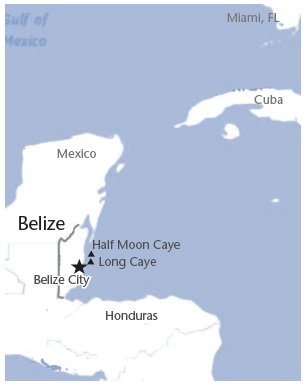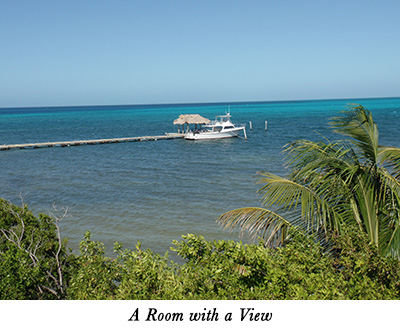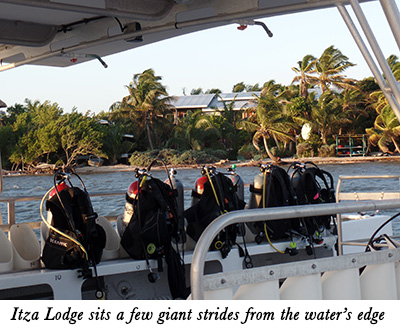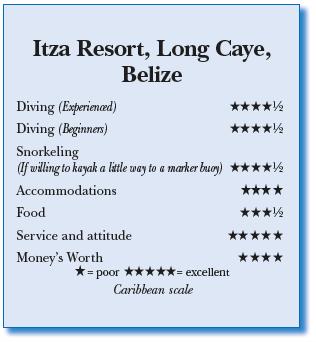Itza Resort, Long Caye, BelizeContents of this Issue: Itza Resort, Long Caye, Belize Welcome John Bantin, Undercurrent’s New Senior Editor Considering a dive trip to Indonesia? Diving In Indonesia – How to Plan your Trip Policing Divers Who Harass Marine Life Dark Chocolate: It Doesn’t Just Taste Good, It’s Good For Your Diving That Deep Stop Option on Your Computer Goodbye Old Fashioned Compass? Guinness World Record Dives with Added Bite Travel Agent or the Internet? Part II Burn Your Mask: Dealing with Those Annoying Foggy Lenses ... and a Last Resort Trick An Unusual Cause of Diver Deaths and What You Can Do To Prevent It Self-Aware Mantas Wave at Themselves Photo Contest Winners and Losers Editorial Office: Ben Davison Publisher and Editor Undercurrent 3020 Bridgeway, Suite 102 Sausalito, CA 94965 great lodge, great diving from the April, 2016 issue of Undercurrent
Dear Fellow Diver: Nothing like the standard-issue rum punch welcome drink to brighten my eyes after an arduous travel day beginning in Detroit and ending with a long, pleasant 50-mile boat ride to Lighthouse Reef, the most distant atoll in Belize's Barrier Reef. I was immediately impressed with the three-year-old, 24-unit Itza Lodge, built of tropical woods, and their fine staff, but would the diving match? I got "yes" for my answer on Day Two as I dived "Playground" off Half Moon Caye. I stepped off the stern of the 40-ft. twin-diesel dive boat, then kicked over the sand flats to the wall, lingering behind the other six divers to play with garden eels and rosy razor fish that disappeared under the sand at the point of my finger. At the wall, I was greeted by a six-foot reef shark that ignored the herd of divers admiring her muscle and grace. As I checked holes and ledges with my light, pausing to study arrow blennies, divemaster Mario Sánchez shook his rattler as another Caribbean reef shark passed, one of five on this dive. An avalanche of Creole wrasse poured down a sand chute and swirled around me, giving me a tingle. Gliding out of the next chute into the blue, an eagle ray sailed effortlessly with no wing flapping -- I wondered what was propelling it.
I was delighted to see many mature Nassau groupers, which have been fished to near-extinction throughout much of the Caribbean. They even allowed divers to pet them. (Later I asked Mario if this was due to feeding; he said not, but I'll reserve judgment.) They were not the only big fish in this protected reserve: black and tiger groupers were much in evidence, and a big dog snapper passed by at my two-minute stop at 60 feet that Mario required on deep dives. Since this was a checkout dive for tomorrow's 140-foot Blue Hole dive, Mario had led us down to 115 feet. For sure, one of my best-ever Caribbean dives. Just three years old, Itza Lodge sits a few giant strides from the water's edge, a sandy area stocked with beach chairs and a rack of kayaks and paddleboards. Owner Jim Cullinan told me that after camping on Long Caye a decade ago, he bought the whole island and built his lodge. After making a fortune in Chinese production plants, he now leads a life without shoes or demands from Walmart to cut Chinese workers' wages even lower. The lodge's sitting room is decorated with a huge, detailed, beautifully painted floor map of Lighthouse Reef, but most everyone hung out in the lodge's open-air restaurant and bar. I enjoyed kicking back on my room's balcony, with a great view, sipping the Cuban añejo rum we brought. My room had two queen beds, an adequate bathroom and clothes rack area. It had both overhead and standing fans, and some evenings I deployed both. In February, I didn't miss A/C at all, but Belize heats up in the summer. Filtered drinking water was right outside on the porch. The dive boat was a 40-foot twin diesel behemoth, substituting for their regular dive boat, a 30-footer with two big outboards. We had two divemasters -- head divemaster Patrick Parks and Mario Sánchez -- for just seven divers, which worked well since besides my partner, I had an inexperienced friend along who enjoyed concierge service. Mario, who they bring from the mainland when they need him, left after three days. The manager, Anne-Marie McNeil, is also a dive instructor.
The first morning of my trip, after heading for the lodge at 6:30 a.m. to bring good Belizean coffee to my partner, I put my dive gear outside our room for pick-up, the last time I handled it until departure. Then back to the lodge for eggs, bacon, and biscuit breakfast, with some fruit on the side. Thankfully, it was to my taste since meal choices are limited. (You could choose fresh fruit and toast for breakfast.) Our dive briefing -- all seven divers arrived on our crossing -- was thorough, though a little overbearing. The rules seemed strict, such as "all dives except the Blue Hole and the preceding check-out have a 60-foot maximum." On the first dive on Painted Wall, five minutes from the dock, I learned just how strict they were. Mario rattled hard and shook his hand at my partner, who had dipped down to 75 feet to get closer to a passing reef shark. I nicknamed Mario "Bossy," but warmed up to both him and Patrick; they were helpful, good creature-scouts, and safety-conscious. They later loosened up, and we laughed about who actually was bossier, Mario or me.
Lunches, set out at 12:30 p.m., were varied, with the conch and roots soup one I favored, as well as a tasty barracuda sandwich, as well as snapper with red beans. Dinner the first two days was gringo comfort food like spaghetti, but after a couple days, they met my request for more Belizean food with snapper and conch. Late in the week, Miss Glenda, a cook and baker, whispered to me that they had obtained three lobsters for my companions and me. A fine score, despite my embarrassment when another guest gave me the envy-eye. Every dinner included a freshly made dessert, such as pineapple cake, carrot cake, or devil's food cake. Actually, my favorite food came out at 6 p.m. as bar snacks -- conch fritters or conch ceviche. After arriving late one day and finding them gobbled up by others, I made sure to be timely to the little lodge bar, a bottle of Belikan stout in hand. After dinner, nightlife was visiting with fellow divers -- interesting folks from Holland and Japan and one U.S. couple met up with their daughter, who lives in Israel -- listening to Bob Marley or oldies. I mentioned the Garifuna singer, Andy Pelacio, who died too young, and within minutes, he was on. Most afternoons, there was a third boat dive at 2:30, returning in time for a 4 p.m. shower, leaving time to relax before dinner. Hot shower water was scarce, and though I didn't mind, it was like spotting a hammerhead: nice, but rare. That was literally true: I had hot water once and had a single close encounter with a 7-foot scalloped hammerhead at Ron's Place on Half Moon Wall. At Aquarium on Long Caye Wall, a hawksbill eased by me close enough to touch, then my partner showed me some swimming crinoids on a sea rod, a fresh addition to my invertebrate list. I wish, however, that the divemasters wouldn't feed the chubs, which followed us for most of the dive.
Day Three started early, with coffee and a bagel at 6:15 before a 6:45 a.m. departure to the Blue Hole, a 20-minute trip to the north in Lighthouse Atoll. The goal was to beat the liveaboards and day boats making the 2.5-hour trip from San Pedro. I was disappointed to find the sand slope near the moorings completely trashed, so different from my trips here 15 years ago. This is the signature dive of Belize, but for me, it was a "been-there-done-it dive," though still a unique experience. The "blue" of the hole was cloudy from the weather stirring sand into the deep. I descended the limestone cliff quickly to 130-140 feet to snake through the tree-trunk stalactites of the overhang, and then started my ascent, pausing at 60 feet and then again at 20 feet for five minutes. I spent the eight minutes under the ledge trying to find an opening to the underground river that caused this giant cenote when the ocean was 400 feet shallower during an ice age. Later Mario told me no river cave has ever been found. As we headed back to breakfast, three boats jockeyed for the moorings. On my sixth and final diving day, the wind moved toward the less favorable north so I stayed to walk the mile of boardwalk through the mangroves and lagoon (I spotted five species of herons and collected a comparable number of bug bites, so bring DEET.) I was told I could eye-shine crocs off the boardwalk at night or find Mayan pottery shards on the beach. Cullinan said the Maya used Half Moon Caye for ceremonial purposes, as it was the eastern edge of the Maya world. Maybe they liked to get away from the crowds, too -- a thousand years ago, the area of Belize had a population of 1 million, three times more than at present.
Itza Lodge is 50 miles from any run-off with no commercial fishing, and while the fish life is prolific, the live coral cover has suffered greatly since my last visit 15 years ago. The serious impact of climate change and ocean acidification is inescapable. Still, Itza offers some of Belize's best diving in an isolated, old-Caribbean atmosphere. If you want to exit the dive-tourism freeway, and you're willing to pay more to do it, then Itza merits a spot on your wish list. The author, along with his partner, has been diving and exploring the Caribbean, Central America and its islands for 30 years. He says he loves Cozumel, but usually dives the less-traveled outposts, and often writes about them for Undercurrent. He adds that "It was Ben who suggested I go to Itza. We want a story."
|

I want to get all the stories! Tell me how I can become an Undercurrent Online Member and get online access to all the articles of Undercurrent as well as thousands of first hand reports on dive operations world-wide
| Home | Online Members Area | My Account |
Login
|
Join
|
| Travel Index |
Dive Resort & Liveaboard Reviews
|
Featured Reports
|
Recent
Issues
|
Back Issues
|
|
Dive Gear
Index
|
Health/Safety Index
|
Environment & Misc.
Index
|
Seasonal Planner
|
Blogs
|
Free Articles
|
Book Picks
|
News
|
|
Special Offers
|
RSS
|
FAQ
|
About Us
|
Contact Us
|
Links
|
3020 Bridgeway, Ste 102, Sausalito, Ca 94965
All rights reserved.


 Morning two-tank
trips usually left at
8:30 a.m., returning either to the lodge or to Half Moon Caye between dives. The reef arcs about four
miles around Long Caye and Half Moon Caye, a protected reserve with diving superior
to Long Caye. On Half Moon Caye, a Belize Natural Monument, a lovely walk
led to hundreds of nesting red-footed boobies and magnificent frigate birds. A
sign near at the visitors' center read: "Please don't feed the sharks." I found
out how seriously this is taken when I asked about spearing lionfish and was told
it was not done to avoid habituating the sharks to divers.
Morning two-tank
trips usually left at
8:30 a.m., returning either to the lodge or to Half Moon Caye between dives. The reef arcs about four
miles around Long Caye and Half Moon Caye, a protected reserve with diving superior
to Long Caye. On Half Moon Caye, a Belize Natural Monument, a lovely walk
led to hundreds of nesting red-footed boobies and magnificent frigate birds. A
sign near at the visitors' center read: "Please don't feed the sharks." I found
out how seriously this is taken when I asked about spearing lionfish and was told
it was not done to avoid habituating the sharks to divers. Painted Wall was a typical dive on Long Caye. I kicked over the sand amid
pesky chubs, and was greeted at the wall by a stream of Creole wrasse curving
around a school of juvenile bar jacks; then, with my light, I found a huge crab,
a spotted lobster, a butter hamlet, and other cuties and later watched barracuda
being cleaned. Patrick found me a secretary blenny, which I needed my magnifying
lens to see. But then, three eagles in formation sailed by to steal the show.
Caribbean reef sharks passed by a couple times, and soon my 50 minutes were up,
so I passed up my fins and climbed aboard on one of two big ladders, my gear
handled competently by the crew. All the dives except the Blue Hole were drift
dives in slight or no current, perfect for this senior diver, as was the 81°F
water temperature. My 15-dive package included one night dive, but it was never
mentioned and I didn't ask for it; the site seemed too stirred up.
Painted Wall was a typical dive on Long Caye. I kicked over the sand amid
pesky chubs, and was greeted at the wall by a stream of Creole wrasse curving
around a school of juvenile bar jacks; then, with my light, I found a huge crab,
a spotted lobster, a butter hamlet, and other cuties and later watched barracuda
being cleaned. Patrick found me a secretary blenny, which I needed my magnifying
lens to see. But then, three eagles in formation sailed by to steal the show.
Caribbean reef sharks passed by a couple times, and soon my 50 minutes were up,
so I passed up my fins and climbed aboard on one of two big ladders, my gear
handled competently by the crew. All the dives except the Blue Hole were drift
dives in slight or no current, perfect for this senior diver, as was the 81°F
water temperature. My 15-dive package included one night dive, but it was never
mentioned and I didn't ask for it; the site seemed too stirred up. Isolation does present issues for the Lodge. The main generator went down, so
all power came from solar and a back-up generator. For two days, the power went
on and off, and sometimes the water pump was shut off to conserve power. But the
staff hustled to secure parts from the mainland and get it running. For sure, the
dive operation held its own. I used my own gear, but other guests had no trouble
renting good gear. The dive boat had drinking water, fruit, snacks, and a DAN
kit. The aluminum-80 tanks were filled
to 3000-3200 psi. There were no serious
cameras in use while I was there; they'd
bring a rinse bucket aboard for them.
Paul Humann ID books were on hand, meaning
I lugged those heavies needlessly.
Isolation does present issues for the Lodge. The main generator went down, so
all power came from solar and a back-up generator. For two days, the power went
on and off, and sometimes the water pump was shut off to conserve power. But the
staff hustled to secure parts from the mainland and get it running. For sure, the
dive operation held its own. I used my own gear, but other guests had no trouble
renting good gear. The dive boat had drinking water, fruit, snacks, and a DAN
kit. The aluminum-80 tanks were filled
to 3000-3200 psi. There were no serious
cameras in use while I was there; they'd
bring a rinse bucket aboard for them.
Paul Humann ID books were on hand, meaning
I lugged those heavies needlessly. My last morning presented an unwelcome surprise: the 2.5-hour trip back to
Belize City would be aboard an open-top boat; I was soaked within minutes after
departing. A quick change of clothes dockside at the Ramada improved my mood, and
Itza's driver whisked us to the airport, where we rented a car to travel Belize's
incredible countryside and to enjoy the rainforest birds and other wildlife.
My last morning presented an unwelcome surprise: the 2.5-hour trip back to
Belize City would be aboard an open-top boat; I was soaked within minutes after
departing. A quick change of clothes dockside at the Ramada improved my mood, and
Itza's driver whisked us to the airport, where we rented a car to travel Belize's
incredible countryside and to enjoy the rainforest birds and other wildlife. DIVER'S COMPASS: I paid $2082/person, plus $230 tax for a 7-day
package, comparable to resorts on the other two Belize atolls, allinclusive,
with no nickel-and-diming charges. The manager promptly
granted my request for a free upgrade to an upstairs room, since
they had empty space. . . . To snorkel, you need to kayak a short
way to a buoy at the reef-line. . . .Wi-Fi was a little pokey, but
fine for email, and the office phone was available to call home. .
. . Credit cards are accepted, but bring cash for tips -- dollars
are currency everywhere, US$1 = $2 BZ. . . .
DIVER'S COMPASS: I paid $2082/person, plus $230 tax for a 7-day
package, comparable to resorts on the other two Belize atolls, allinclusive,
with no nickel-and-diming charges. The manager promptly
granted my request for a free upgrade to an upstairs room, since
they had empty space. . . . To snorkel, you need to kayak a short
way to a buoy at the reef-line. . . .Wi-Fi was a little pokey, but
fine for email, and the office phone was available to call home. .
. . Credit cards are accepted, but bring cash for tips -- dollars
are currency everywhere, US$1 = $2 BZ. . . . 